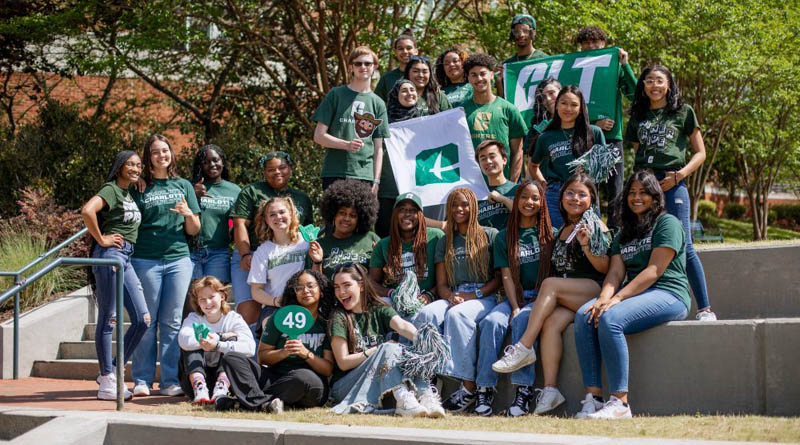Charlotte Conducts Student Leadership Research Initiative
Measuring the Impact of Co-Curricular Learning Experiences on Student Leadership Development
Sunnya Hadavi ‘24 is an international studies and data science major graduate who served two years as the Niner Times editor-in-chief. Lance Bumgardner ‘24 studied economics while leading programs for orientation, families, first-generation students and alternative spring break service trips. Amaree Jones ‘25, a junior psychology and interdisciplinary studies major, gives back as a peer mentor, involvement ambassador and a student union building supervisor.
These students and many others exemplify how the University’s co-curricular learning opportunities profoundly shape a student’s college experience, providing hands-on learning and professional development, while building connections, confidence and a shared sense of community.
Expanding high-impact learning practices to strengthen academic and co-curricular development is an integral part of Student Affairs’ strategic plan. To better understand the impact of these types of experiences on student leadership development, Student Affairs conducted a multi-year research initiative — the Divisional Student Leader Initiative, or DSLI.
Defining Competencies and Measuring Success
Student Affairs staff partnered with the University Career Center to frame student engagement across five competencies and learning outcomes identified by the National Association of Colleges and Employers (NACE) and the Council for the Advancement of Standards (SAC).
These five competencies include problem solving, career management, teamwork/collaboration, professionalism/work ethic and wellness. Together they form the basis of the DSLI assessment rubric that is administered to students participating in an initiative — such as a program or cohort, leadership position, or employment opportunity — and to a staff person who works closely with the student. Assessment is conducted at the beginning, middle and end of the initiative.
To date, a total of 296 students have participated in the DSLI since it launched in 2020-2021.
“What we found was significant student leadership development growth demonstrated across all domains, as confirmed by both students’ self-ratings and those of the staff observers,” Ellissa Brooks Nelson, divisional director of student affairs research and assessment, said. “Digging deeper, we can draw even more specific conclusions on populations aggregated by race/ethnicity, gender identity and sexual orientation by looking at areas of growth over time.”
In Students’ Own Words
Nine DSLI participants were selected to participate in video interviews, adding an additional qualitative component to the study. Unscripted, their reflections frequently returned to three main themes: confidence, connection and community.
Kennedi Thornton ‘24, a criminal justice major, echoed those thoughts. “I’ve seen my confidence grow a lot, I feel more secure in myself and my decisions. I also feel a lot smarter in the choices that I make, for not only myself but for groups of people.”
For Bumgardner, growth meant “having confidence in my abilities and advocating for myself, and leaning into uncomfortable spaces whether that’s something I’m not as skilled in or something that I don’t like to talk about as much.”
Students cited confidence in relation to taking pride in one’s accomplishments, learning new skills, delegating and decision making, but that confidence was also expressed as feeling more empowered to build connections with others.
“I saw all these highly motivated people and it made me want to be a better person, a better leader, and just get to know people more and their stories,” said Abby Brewer ‘24, who graduated with a degree in health systems management. “Being able to step into a community where everybody did not look the same as me, everybody did not come from the same background, whether it was their race, religion, belief systems, [meant] I had to learn more about them.”
These connections led to more willingness to step out of one’s comfort zone and embrace a broader sense of community.
“After being involved — the people, the connections, the community, you can name it whatever you want — it’s the ideals and culture that makes it like a second family,” said Eric Hedgepeth ‘24, who graduated with a degree in computer science. “For some, it is their family.”
James Citrin ‘25, student body vice president, as well as a business management and political science major, recognized the empowerment found in helping others. “The value that you provide others defines your character, and therefore these leadership opportunities have given me a platform to help hundreds, if not thousands, of people.”
Setting the Stage for Success
More than one student referenced that their high school experiences with the COVID-19 lockdown inspired them to actively pursue involvement opportunities in college, seeking belonging and community in a new environment.

